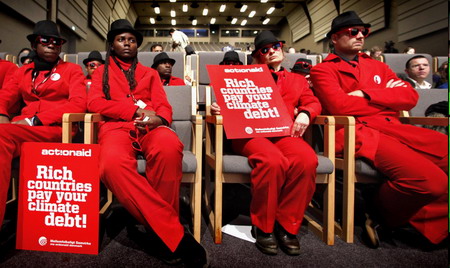Top News
Wealthy nations urged to do more
(China Daily)
Updated: 2009-12-10 07:16
 |
Large Medium Small |
|
|
COPENHAGEN: A leading Chinese climate change official has criticized rich nations for attempting to wriggle out of their obligations to poorer nations in the fight against global warming.
Su Wei, who is one of Beijing's senior officials at the United Nations' climate talks in Copenhagen, said wealthy nations seem to lack the political will to deal with global warming.
He made the comments on Tuesday as a text was made public suggesting rich countries were hoping to avoid their Kyoto Protocol commitments and heap more responsibility on poorer nations.
Su said the targets outlined in the leaked text fell short of emissions cuts called for by UN scientists who would like a reduction of between 25 and 40 percent from 1990 levels by 2020.
It was "unfair", he said, to set a limit on nations that were still developing while emissions from fully developed countries were still rising.
And he described an anticipated offer of financial support from rich countries to poorer nations of $10 billion a year as a drop in the ocean.
"If thought about in terms of the world's population, what is being talked about is less than $2 per person," he said.
Su contended that the success of the Copenhagen talks hinged on what the US will say and do, and he expressed disappointment in President Barack Obama's plans so far.
"Currently, the target is to reduce emissions by 17 percent from the 2005 level. I think, for all of us, this figure cannot be regarded as remarkable or notable," he said.
The EU's announced 20 percent target was also too little, too late.
And, while the new government in Japan has offered to cut emissions by 25 percent by 2020, Su said clauses on the offer made it less impressive.
"The Japanese have actually made no commitment because they have set an impossible precondition," he said.
Japan, which is the world's fifth-largest emitter, has said its commitment depends on ambitious targets being set by other major polluters.
But Su's most vehement criticism was reserved for rich countries that seemed to want to violate international agreements. He said they wanted to go back on undertakings that allowed poorer countries to put economic growth ahead of reducing emissions.
Su made his comments as the so-called Danish Text was made public. The document was widely reported as being a departure from the Kyoto Protocol, which is the only legally binding treaty on carbon emissions.
The Danish Text suggests less developed countries should be allowed to emit no more than 1.44 tons of carbon per person by 2050 but rich countries should be allowed to pump out 2.67 tons.
UNFCCC Executive Secretary Yvo de Boer played down the contentious paper.
He said in a press release: "This was an informal paper ahead of the conference given to a number of people for the purposes of consultations. The only formal texts in the UN process are the ones tabled by the chairs of this Copenhagen conference at the behest of the parties."
Meanwhile, China yesterday urged Obama to increase a US offer to cut carbon emissions.
China's top climate envoy Xie Zhenhua also said that China wanted to play a constructive role at the Dec 7-18 climate talks.
"I do hope that President Obama can bring a concrete contribution to Copenhagen," Xie said.
When asked whether that meant something additional to what Obama has already proposed, a 3 percent cut on 1990 levels by 2020, Xie said: "Yes."
Xie also said that China could accept a target of halving global emissions by 2050 if developed nations stepped up their emissions cutting targets by 2020 and agreed to financial help for the developing world to fight climate change.
"We do not deny the importance of a long-term target but I think a mid-term target is more important. We need to solve the immediate problem."
"If the demands of developing countries can be satisfied I think we can discuss an emissions target," to halve global emissions by 2050.
The deputy chief of the National Development and Reform Commission (NDRC) said he wanted rich countries to cut their emissions by 25-40 percent below 1990 levels by 2020.
"It is our hope that the emissions cuts of developed countries can fall into the range of 25-40 percent (below 1990 levels".
Earlier this year, at previous rounds of UN talks, China had insisted on a cut of "at least 40 percent".
Xie said that he preferred a final, legally binding agreement at the meeting in Copenhagen, but if that were not possible a deadline to wrap up a full treaty by June "would be very good".
Reuters - China Daily














